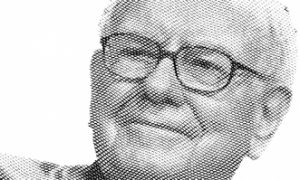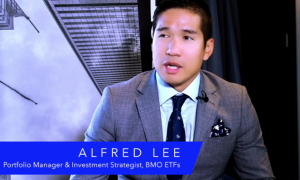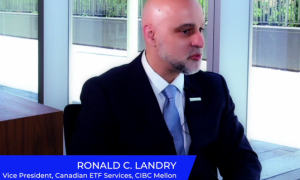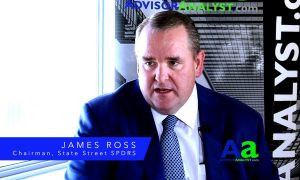Sep.14 -- Joel Tillinghast, fund manager at Fidelity Investments, discusses his approach to stock picking with Bloomberg's Erik Schatzker. - (20:52)
Transcript:
Eric Schatzker, Bloomberg: Joel, It’s a richly valued stock market - how does somebody who has made his career as a low-priced stock picker, a value manager, operate?
Joel Tillinghast, Fidelity Investments: It’s tough, because I am looking for extreme values. I want something that’s not just a little underpriced, but has a big gap between price and intrisic value, and a long runway. To top that off, I’m supposed to stick to stocks that are under $35.
So most of those companies are international - Japan is very well represented in the fund; Japanese small caps, also other international markets, but especially Japan.
ES: How much of a macro overlay do you use when picking foreign stocks?
JT: Not very much … in the book I recently wrote, “Big Money, Think Small,” there’s Chapter 7, which is about macro overlays, and how I blew myself up with a macro overlay, so, No. Other than very big picture , i.e. if Korea turns into war, that’s very bad news.
ES: That’s what I was thinking - so you do incorporate some of those things, you have to, we all have to.
JT: How do you handicap that, I can’t handicap that.
ES: Fair enough. Hard to handicap. What do you find the biggest challenge right now, in, finding and ultimately picking these low priced stocks?
JT: You always have to have … to get a bargain, you have to think differently than the market, and its a very picked over market; so my frustration is retail - lots of the companies will be dead meat because of Amazon, but some of them will adapt, and become omni-channel retailers, and sorting out the dead from the living is tough work, and takes different paths than you would have expected.
ES: Have you figured it out?
JT: No, only if Jeff Bezos will conference call me in and tell me who’s going to die.
ES: I’m not sure he knows. He’s got his ideas about who he wants to kill.
Have you found any companies that you think will survive and thrive in this retail transformation, thanks to Amazon?
JT: It’s a moving target … I thought auto parts retailers were well-protected, but the same day delivery that comes with Whole Foods could also be in auto parts and I thought that protected auto parts retailers.
ES: So, auto parts retailers is something that you thought about. What else have you gone through and said … hmmm … maybe its got promise, or decided that there’s no future whatsoever?
JT: Changing discounters like TJ Maxx and Ross Stores probably are better protected, but its hard to tell, because Bezos says, “your margin is my oportunity,” so all of the businesses that look like great businesses to me are on his target list.
ES: So there may be some survivors, but at the moment it may be almost impossible to tell.
JT: Its hard to tell.
ES: How do you participate in transformative industries or game changing technologies like what Amazon is doing with eCommerce, when so many of those stocks, to the degree that they even go public anymore, aren’t low priced?
JT: Yup, they’re not low priced, they’re not even publicly traded. One of the tragedies of being a small-cap manager is that the number of companies has dropped in half.
I was at the meeting for America Online, which was a big thing in the 90s, and met Michael Dell on the IPO, but those companies are not coming public anymore, and they’re not small cap anymore, which is a great frustration for me.
ES: So can you participate in secondary or tertiary ways?
JT: That’s the great frustration. It’s become so much of a winner take all, monopolistic, oligopolistic market in the United States.
ES: And that is a feature of today’s market; that is something you have not seen in what, 28 years, since you started doing this in ’89?
JT: It’s a feature of America’s economy, increasingly, over the last couple of decades. Its become more oligopolistic, more winner-take-all. Its, its …
ES: In the stock market, and in society.
JT: Yeah! So Amazon prospers, how do I play eCommerce? There’s Wayfair, but there’s also lots of carnage, there’s lots of retailers that won’t make it, so in the Russell 2000, which is my benchmark, there’s more losers than winners, and a lot of the winners in eCommerce are private companies, and Wayfair isn’t the same bet as Amazon.
ES: Is anything going to change that winner take all situation you observe, and we’re living in?
JT: Not that I know of, I think that’s part of why politics is so divisive.
ES: You’re not buying retail … It’s hard to participa …
JT: I am.
ES: You are?
JT: I hold retail, but not with great confidence.
ES: That’s even tougher isn’t it?
JT: Yes! Yes. The problem with Value investing, is that you are saying that the future is less dark than people think; whereas, its great to be a growth investor and say “The future is even brighter than you think! The future is not only going to be good, its going to be amazing!”
I love those kinds of stocks, but what I’ve got, it’s overcast, not hurricane warning.
ES: So, does the difficulty of value investing that you describe, make you question the value of Value?
JT: No. the whole point of the book is thinking about how you get to those estimates of value and part of it is about the resilience of business. I think its still a valid approach.
ES: So when and why does the Value investor find redemption?
JT: When the future does turn out to be less bleak than people expect, or when they luck on to something that’s awesome, when they thought it would be merely good.
ES: That’s always been the case, I guess.
JT: Yup,
ES: It’s just harder now than it used to be.
We talked about retail, as you said, buying and holding, but not with a great deal of confidence. What else are you buying?
JT: Lots of Japanese small caps.
ES: That’s the best place to prospect right now?
JT: Yeah! It is fantastic … there are about as many small cap companies in Japan as in the United States, with 40% of the population, because in Japan, it’s prestigious to be publicly listed, whereas, everybody wants to be in the private placement ‘Unicorn’ market now [here].
ES: We talked about the challenges of value investing, we haven’t talked about the challenges that confront all active managers, which is the passive revolution - how are you thinking about it?
JT: I think active investors add value to investors in 5 ways.
They bring the right attitude,
They try to invest for the long term rather than gambling,
They know what they own, and the limits of knowledge,
They avoid crooks and idiots in management,
They look for resilient businesses, and they don’t pay too much.
In the passive revolution says, “I will take a little slice of all of that.”
If you day-trade the S&P, its gambling, and a lot of the activity in ETFs is just that.
ES: Its gambling?
JT: Yeah! If you’re day-trading it, its gambling.
ES: What if you’re just buying and holding it? What if you just want beta?
JT: Then, then, what you’re taking is a slice of ignorance. You’re saying, “I don’t really know that much about these biotech companies, but I’ll take a market weighting in that.”
“There are crooks and idiots, out there in management, and I’ll take a slice of THAT.”
“There are businesses that are going to get crushed, and I’ll take a slice of THAT.”
“The market might be fully valued, but I’ll take a slice of that.”
ES: So, that’s a criticism I’ve heard in part, but not expressed just the way you’ve expressed it. There are other critics, of passive vehicles, among them, Seth Klarman from Baupost, for example, Paul Singer, Jason Carr from Tourbillon Capital; these people have looked at ETFs and passive vehicles and described them as anything from “Weapons of Mass Destruction,” to “products that are devouring capitalism,” to “Instruments that make the markets less efficient.”
Would you agree with any of those assessments?
JT: I do think that they make the market less efficient, in that, you don’t have people critiquing management quality, you don’t have people knowing the limits of what they know, you don’t have people thinking about what value is.
But, I also think that an index fund is a very sensible investment for people who just aren’t that into stocks and investing.
ES: … but who need to find a way to participate …
JT: Yeah, who need to participate somehow … I think its a very reasonable thing for many people to do, but I do think it makes the market more inefficient because people aren’t doing the things that good active managers do.
ES: When you describe the market as being less efficient, how do you see that, how do you experience that as a money manager - what’s changed - what’s different - what’s not as good?
JT: I think there are ‘group moves.’ Last year there were may small cap utilities trading at P/Es of 20x, and over 20x, and they’re never going to grow more than a couple percent a year, they’re sole attraction is the yield.
If you’re going to pay a high multiple, you might as well get some growth and buy Google.
ES: Is there less price discovery, or is it harder?
JT: I think there is less price discovery, or there is more ‘group’ price discovery, factor price discovery, but people don’t know what’s behind the factors, which makes it more, and less, efficient.
ES: I heard passive vehicles described as a problem specific to small and mid cap stocks, and it kind of goes like this:
The small cap or mid cap stocks that aren’t part of large passive vehicles, increasingly become orphaned, by moves in the market, and they never catch up - that under-performance becomes chronic. Have you seen that, do you experience that with your stocks?
JT: Yes, or if people sack their active manager, and move to passive, the net effect is that they buy everything on balance, that the active manager didn’t own, and so those stocks outperform, which can be frustrating, when loss making companies of all types were companies where we thought managers were sub-par, outperform.
ES: Given what you’ve said, all the same, should Fidelity have arrived to the ETF party a bit earlier?
JT: Yeah, I think we probably should have embraced indexing a bit earlier.
ES: Why do you think the firm was reluctant?
JT: Because we have such a great heritage in active management. Because we had fund managers like Peter Lynch or Will Danoff, who …
ES: Or yourself …
JT: Thanks, uh … who’ve done very well.
ES: You don’t love ‘bots,’ but would you consider, if someone asked, designing a low priced stock ETF?
JT: I’d be interested in an Artificial Intelligence project, but I’m not so interested in an ETF … I don’t think a formula driven approach would add value, but if you had an artificial intelligence way of telling me about management, and telling me about business resilience, that would be fascinating.
ES: Are you experimenting with it yet?
JT: There’s a small project on AI at Fidelity, but there’s nothing to report there.
ES: Now, when you say small, is it something that you’d like to see bigger, and you’d like to become part of if possible.
JT: We’ll see what the future brings.
ES: Are you employing technology to get better results in what you do in any other way?
JT: Not in any way that I can talk about.
ES: Let me ask you about fees. I checked, and the expense ratio on your fund is 0.88%. How does that compare to where it used to be say 5 or 10 years ago, or 15 years ago?
JT: The expense ratio includes a performance fee, the fee will go up when the fund outperforms and it will go down when it under-performs, so fluctuations will depend upon how the fund is performing.
ES: Let’s take out the performance fee …
JT: It’s been relatively stable.
ES: Where do you see it in 5 years?
JT: Probably lower, since clients are moving to lower fee funds.
ES: Do you feel pressure to cut costs?
JT: Yeah, I think you always have to be efficient.
ES: How do you experience it and how do you respond?
JT: That’s more in other parts of Fidelity; making the analysts work harder, making the portfolio managers work harder.
ES: And do you feel the redemptions in your fund are more the result of fees, performance, or shift to passives, or perhaps something else?
JT: Probably a bit of all of them, but a great deal of them is the shift to passive, especially among institutional and corporate clients.
ES: Fidelity has always been big on internal research, but you’re a consumer of Wall Street research the way most active managers are. How would you describe the quality of Wall Street research today?
JT: Yes, yes. It’s been a tough way to make a living. The number of research boutiques has gone down - the number of companies to follow has gone down, so …
ES: It’s always been hard to get small cap research to begin with …
JT: Although, there are a number of small cap boutiques and I find them very helpful.
ES: There’s a transformation in the research business underway in Europe, thanks to this new directive called MiFid II. Do you think its going to come here, and what impact is it going to have on the kind of research you consume?
JT: The question is whether Fidelity can replicate the research internally for a lower cost, whatever makes us consider, what’s the lowest cost way of providing it?
ES: Can you do it?
JT: There’s no decisions. It’s above my pay grade actually.
ES: Do you find the work that Fidelity is doing internally, the research Fidelity is doing on its own, as good or better than its ever been.
JT: I think its fantastic. In Japan, we have a great small cap team, some great researchers there who cover stocks that even the Japanese brokers don’t really follow very well.
ES: Its been [28 years] since 1989, since you joined Fidelity. What’s it like there today, relative to what it was like back then?
JT: It’s bigger, Peter Lynch has retired, and he was fantastic for Fidelity, I think its still a place that stresses accountability and performance.
ES: And if you look back over the course of those 28 years, and you think about the work that you do and the market that you participate in, what’s most surprisingly the same, what has endured, perhaps despite your best guess or expectations?
JT: The role of human emotions, that people get overly enthusiastic about things that are going well today, and people get too pessimistic about things that are going badly today. Human behaviour doesn’t change.
ES: What’s most different?
JT: The speed at which information disseminates. In the eighties, I would call companies and ask them to read the line items on their earnings releases because they didn’t have a fax machine at the company, and today, you could be in Wyoming in the middle of nowhere, and you can get an instantaneous email with all numbers.
ES: Now, is the speed at which information is disseminated something to embrace or something to be frightened of?
JT: It’s a good thing in that its more efficient, but it also can distract you from what is enduring value, just because it is so accesible that you’re thinking about “How is the latest quarter?” rather than, “Where’s this company going to be in 5 years?”
ES: Joel, thank you very much.
Copyright © Bloomberg

























